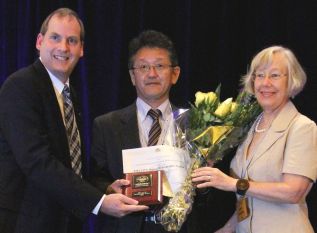JMA 137°E Repeat Hydrographic Section PICES Ocean Monitoring Service Award (POMA) – PICES 2016 POMA Award
 Dr. Toshiya Nakano (centre) accepting the POMA from
Dr. Laura Richards (PICES Chairman) and
Dr. Thomas Therriault (PICES Science Board Chairman)
Dr. Toshiya Nakano (centre) accepting the POMA from
Dr. Laura Richards (PICES Chairman) and
Dr. Thomas Therriault (PICES Science Board Chairman)
At the 2016 PICES Annual Meeting in San Diego, USA, the Japan Meteorological Agency 137°E Repeat Hydrographic Section was announced the recipient of the 9th POMA Award.
The presentation ceremony took place on November 9, 2016, during the PICES-2016 Opening Session and was conducted by Drs. Laura Richards (PICES Chair) and Thomas Therriault (PICES Science Board Chair). A commemorative plaque and a certificate were presented to Dr. Toshiya Nakano (Head of the Marine Environment Monitoring and Analysis Center, Global Environment and Marine Department of the Japan Meteorological Agency) who accepted the Award on behalf of colleagues who have manned the Repeat Hydrographic Section.
Dr. Therriault introduced the award and read the following Science Board citation.
Science Board citation for the 2016 POMA
The PICES Ocean Monitoring Service Award (POMA) recognizes organizations, groups and outstanding individuals that have contributed significantly to the advancement of marine science in the North Pacific through long-term ocean monitoring and data management. The award also strives to enlighten the public on the importance of those activities as fundamental to marine science. It draws attention to an important aspect of the PICES Convention that is less appreciated: "to promote the collection and exchange of information and data related to marine scientific research in the area concerned".
Please join me in congratulating the recipient of the 2016 POMA Award, which is the Japan Meteorological Agency (JMA) 137°E Repeat Hydrographic Section.
The 137°E meridian was chosen for monitoring and investigating large-scale ocean variables because it crosses the major current systems in the North Pacific, including the Kuroshio and North Equatorial Current, and is least affected by local topography and bathymetry. Observations started in 1967 with the line running from 34°N to 1°S - a distance of 3900 km. Three different research vessels have been used to undertake the repeat observations along 137°E. Equipment has varied from a reversing thermometer and Nansen bottles in the early years to advanced, automated atmosphere and oceanic pCO2 and pH sensors. A wide variety of oceanographic variables are measured with additional parameters measured in more recent years. All data are made available shortly after the completion of the cruise. Ocean carbon dioxide and related parameters collected through this survey has been instrumental for the PICES PACIFICA database, and also was included in the GLODAPv2 (Global Ocean Data Analysis Project). The data from this transect have contributed to more than 130 publications since 1967 and clarified the role of the ocean in global climate change.
Ladies and gentlemen, please join me in congratulating JMA, who is represented here by Dr. Toshiya Nakano, as the recipient of the 2016 PICES Ocean Monitoring Service Award.
Dr. Nakano's acceptance remarks
I am greatly honored to receive 2016 PICES Ocean Monitoring Service Award. On behalf of the team working on the 137°E repeat section, I express deep appreciation to all PICES members.
Hydrographic and biogeochemical measurements at 137°E section was started by Dr. Jotaro Masuzawa and his colleagues almost 50 years ago, in winter of 1967, five years after I was born. Half-century-long repeat survey at 137°E section has been playing an important role for demonstrating trends and variations in ocean circulation, warming, deoxygenation, acidification, and so on in the western North Pacific. We should be grateful to Dr. Masuzawa for his foresight 50 years ago. We are also grateful to the past and present captains and crews of R/V Ryofu Maru and Keifu Maru, and many staff of the Marine Division, Japan Meteorological Agency, for their laudable half-century long observational efforts.
We believe this award will strongly encourage JMA to keep this long-term observations and hope they will continue to help documenting the changes in the ocean in the upcoming decades, which hopefully indicate the success of Paris Agreement just became effective three days ago, and then we can receive this award 50 years later again. Thank you very much.